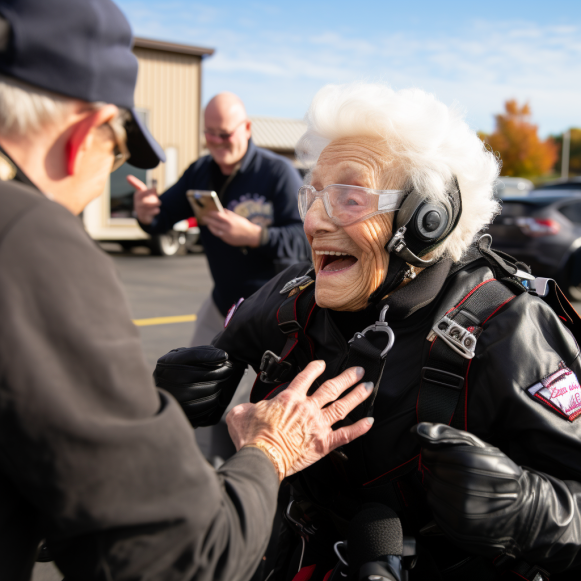Get hired at Disney: 6 insiders reveal how they landed their jobs and share secrets for nailing recruiters’ questions

- Getting a job at Disney is, for many, a coveted entry point into Hollywood.
- But the company is selective, and landing a role at one of its three divisions is tough.
- Business Insider spoke to six current and former Disney employees about what to expect during an interview.
Makall Lauren, 23, shows viewers what it’s like to work at the Happiest Place on Earth on her popular TikTok account @Magikall.
The photographer at Walt Disney World in Orlando got her start in the Mouse House about two and a half years ago through Disney’s College Program, a year-round paid internship that can serve as a springboard to full-time roles across the company for successful participants.
“I’ve always enjoyed making other people happy.” “When I found out there was a job for that, I was determined to get it,” Lauren said, who previously worked as a face painter at an amusement park and as a makeup artist at Sephora. She’s amassed over one million TikTok followers since landing her full-time job following the College Program by explaining how she got in and using humor to shed light on what it’s like to work for the company.
Lauren’s position is in Disney’s parks division (which also includes merchandise and cruises), alongside the company’s two other major divisions, entertainment and ESPN. Disney employs over 200,000 people worldwide, but joining its global workforce in this volatile environment may seem more difficult than ever.
This year, the company tightened its belt, cutting 8,000 jobs as CEO Bob Iger set a $7.5 billion cost-cutting goal. Meanwhile, the entertainment industry will shed tens of thousands of jobs by 2023, preventing many young people from breaking into Hollywood or advancing their careers.
However, for many entry-level and early-career employees looking for a job in entertainment, whether on the screen or in live experiences, Disney’s global reach, iconic IP, and storytelling legacy make it a desirable place to work.
According to Dan Green, director of Carnegie Mellon University’s Heinz College’s master of entertainment industry management program, a job at Disney can pave the way for a bright future in Hollywood. “It’s a positive thing on your résumé,” he explained to Business Insider, “because of their hiring policy and the fact that it’s such a well-known brand.” Green interned at Disney in the 1990s, handling tasks such as script coverage (summarizing screenplays for creative executives), and several of his students have gone on to work for the company.
So, how can Disney hopefuls break into the company? BI spoke with six current and former Disney employees, as well as other experts familiar with entertainment-industry recruiting, to help demystify the interview process and some of the techniques Disney employs to evaluate prospective hires. Because they were not authorized to speak with reporters, most company sources requested anonymity. Disney spokespersons did not respond to a request for comment on recruiting practices or the number of people who apply and are hired each year.
According to the sources, hiring experiences vary greatly depending on the division and role in question. A staff position in the parks, for example, would be very different from a position at a Disney-owned network or studio.
These individuals — primarily junior and early-career employees in roles ranging from technology and engineering to television and creative development — went on to say that Disney looks for candidates whose skills match the needs of the role and who are problem solvers. According to the company, it also wants to hire people who have a connection to its history, products, and DNA.
Here’s how the hiring process intends to do so, and what candidates should expect.
Step one: Meet a recruiter
Connecting with an official recruiter for the company is usually the first step in Disney’s hiring process after applying online for an open position.
Lauren explained that there are many different types of recruiters; some specialize in entertainment, while others specialize in filling part- or full-time positions. Others concentrate on the Disney College Program. Some can assist you in determining where in the company you are most likely to succeed, she added.
Recruiters have significant influence over how the interview process plays out, including who advances and who is eliminated. Managers may tell recruiters the specifics they’re looking for in candidates, according to one Disney employee hired during the pandemic. “A lot of times, the hiring manager will say, ‘Hey, this is exactly what I want,'” the worker said.
“It really depends on the position and really, in many ways, it depends on the hiring manager,” Green said of the number of rounds applicants will go through and the tone and tenor of the interviews.
A second current employee, who works in a technology-related function, recalled two interviews: the first with their current boss, and the second with a senior technology staffer and a member of the employee’s current team. The first interview was to see if this person was a cultural fit for the company, and the second was more technical, testing the candidate’s mastery of job-related skills.
Candidates who do not receive an offer should not be discouraged, according to Lauren. Instead, she advised them to seek advice from recruiters about other opportunities. She recently applied for a cosmetology job in the parks, but the proposed transfer fell through. She isn’t giving up, though.
The company gave her feedback on where she could improve — for example, she hasn’t had much experience cutting hair — and she can try again in a few months or look into costuming options.
“Rejection is a form of redirection,” she explained. “It really is kind of more like, ‘Not now, but maybe later.'”
Interview questions tap into candidates’ skills and Disney knowledge
Candidates may face multiple interview rounds, ranging from two or three to five or six, depending on the role. According to sources, the process includes personal and behavioral questions that assess your qualitative aptitude for the job as well as how well you understand Disney’s culture.
“They’d ask, ‘What are your hobbies?'” Alternatively, ‘What were some of your classes while you were in school?’ “And then they’d ask, ‘Hey, do you have any experience with Adobe Photoshop?'” the first employee explained. This person went on to say that the recruiters’ goal is “to make sure this person can not only say they know how to use a language or know how to use a specific tool — but can you give me an example of how they’d use that tool?”
This employee went through the Disney College Program and stated that applicants should expect to take personality tests with automatically scored multiple choice questions that can disqualify candidates.
According to this person, questions could address topics such as how applicants would interact with guests or whether they are problem solvers in their daily lives. For example, a candidate may be asked to choose one of several approaches to a complex situation with park visitors, the person explained.
Multiple sources emphasized one critical question in particular: Why do you want to work for Disney? This question can lead to others, such as: What is your favorite Disney park? Which of these rides is your favorite? According to sources familiar with entertainment-related jobs, recruiters may ask candidates to name a few shows they’ve recently watched. People agreed that a compelling answer connecting candidates to the ethos of the Mouse House can give them an advantage.
This question came up almost immediately in one of Lauren’s early conversations with recruiters, she said. Recruiters, she continues, want to see candidates who are “passionate about the company first and foremost.”
Lauren’s response drew on childhood themes, such as her love of storytelling and her desire to “create happiness for other people.” The second employee (who works in technology) recalled how their upbringing as a first-generation immigrant helped them better integrate into US culture.
Green and other experts suggested asking candidates interested in working in Disney’s entertainment division: “What are you watching on television and streaming right now?” The first employee mentioned “Grey’s Anatomy” on ABC as a favorite show.
“It’s absolutely appropriate to have something in your back pocket on Hulu and Disney — it’s just as important to know what you’re watching on other streamers or network television,” he said. And, he cautioned, don’t limit yourself to obvious options: “‘Succession’ is low-hanging fruit.”
Practical assessments test competencies and problem-solving skills
According to sources, practical assessments that determine how comfortable candidates would be in tackling the qualitative elements of their potential jobs are a hallmark of Disney interviews.
Green stated that in order to demonstrate their abilities, some of his students were asked to complete PowerPoint presentations, script coverage assignments, or data analysis using figures provided by the company.
When Lauren was applying for her current position, recruiters asked her to explain how she’d correct or enhance a series of photos, from improving brightness to adjusting contrast or saturation, and to demonstrate “an artistic eye to see where the creative aspect would come into play.” Recruiters asked her open-ended questions to avoid directing her to specific answers, she said.
The second, tech-savvy employee recalls encountering a coding issue during an interview. “It’s one of those coding questions that seem very small but can easily have gotchas” that candidates might miss at first glance, according to this source. “They gave me a prompt that I had to fill out, either in Java or in pseudocode, and then they said, ‘Okay, imagine this wasn’t the prompt or that the scope of the prompt was a little broader.'” What changes would you make to what you’ve written?'”
A third current employee, a creative assistant in Disney’s entertainment division, recalled being tested on their ability to evaluate creative work, specifically script coverage. “They simply ask for a script to be read — they gave ample time — and then write coverage on it,” said one of the respondents.
The goal, according to this assistant, was for their future bosses to determine whether they could summarize ideas clearly and concisely, “which is critical for a development role.”
Curiosity counts — about the role, the company, the industry
Experts advised candidates to be inquisitive and to ask recruiters their own questions.
“What needs to happen in the first six months for you to consider this to be a successful hire?” suggested Ben White, a recruiting expert who has studied the company’s interviewing processes and assembled videos about getting hired there on his YouTube channel, Ben Talks Talent. He also suggested asking about training and onboarding to demonstrate that a candidate’s attitude toward the job is in the “right place.”
“It shows you’re looking for, ‘What do I need to do to win for you to and to be a great employee?'” he said.
The first employee suggested that candidates ask questions that allow recruiters to show off their Disney spirit. “One question I always ask, because I believe it breaks the ice and humanizes the interview, is, ‘What’s your favorite Disney memory?'” “Or, ‘What’s your favorite Disney character?'” said this individual. “I think it helps to bring it back to, ‘I understand the Disney culture and the people.'”
While asking that of a recruiter may seem bold, this employee claims it can elicit a positive response: “Most of the time they were like, ‘Oh my gosh, no one ever asked me that.'”
Green believes it is critical for candidates to be aware of current events in the media industry. “We’ve been advising students, ‘You should have an opinion about the strikes and what’s happening,'” he said, referring to the recently ended actor and writer strikes that roiled Hollywood this year.
“You are the future executives in the industry,” Green said. “You have to keep a pulse on what’s happening.”





